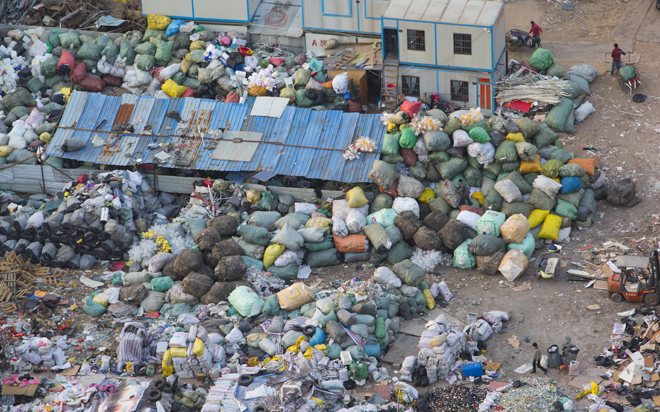By Oliver Berger –
China has experienced a huge increase in coal-burning for power and industry in the last 50 years. The result from burning coal has made China into an unhealthy, hazy space for humans and animals to reside. China is responsible for 30 per cent of all globally emitted greenhouse gases. However, in recent years there has been a rise in low-carbon energy, and emission rates have actually started to decrease. They must want to breathe a little easier.

China has also been exporting products to the rest of the world for decades. Cargo ships span the Earth’s waters to bring us our stuff. What do they go home with? One option for the empty backhauls is to fill the ships with high-quality scrap for reuse back in China. This was a great opportunity for the booming manufacturing country to obtain raw materials. This was also advantageous for other countries looking for avenues to dispose of their waste. It became the norm. So normal in fact, China now receives approximately 60% per cent of the world’s paper, plastic, and metal leftovers.
Somewhere along the line things have gotten messy.
Scrap is great when you get the type of material you actually requested. It is not good when it comes mixed with all sorts of ‘who knows what’. Contamination is a serious issue. Making quality products for market can be painstaking and very costly when your raw product is unreliable.
Processing requirements, facility standards, and environmental regulations are also different in China. Dealing with so much foreign waste has become a challenge and a health hazard. Much unwanted, unusable, or unsortable material has ended up there—among the people, in the land, and in the seas. While doing my research for this article, I came across the term ‘world’s dumpsite’ used to refer to China’s situation. Not a cool nickname.
What is cool, though, is this: I had the pleasure of travelling to China for three weeks with my dad in 2005. We were taken aback with the constant activity around us. Thousands of people would function in their everyday routines without much quarrel. Where we would use machines to do our work, the Chinese used people power. Moving mountains with shovels, they work together as a strong team.
China is currently making headlines in the waste sector with what they are calling, The National Sword. Out of concern for the environment and public health, China is now restricting the import of certain categories of solid waste and significantly lowering the allowable contamination percentages on incoming scrap. They set the bar very low, to a 0.5% -1% contamination rate. Any bit of it and they will refuse the shipment. Current contamination rates vary all over North America. In our province, they can range anywhere from 3.6 to 12.9 per cent, so far.
Collection facilities all over North America and Europe are now having a tough time selling their bales of recyclables since the implementation of the National Sword early this year. Because there are not many processing facilities located locally, the parking lots are piling up with big bricks of scrap and nowhere to go. Some cities are considering removing their recycling programs for the time being until they can sort this out. Having relied on China to deal with the waste for so many decades, for the first time in a long time, we are faced with our leftovers head on.
There really is no “away,” is there?
China has done this before. In 2013 they erected a ‘green fence’ putting stricter regulations on the recycling commodity imports from around the world. This little push brought on some revamping of the recycling in our province, and Recycle BC was born.
Recycle BC created congruence across the province regarding the types of materials we can and cannot recycle—at very little cost to the taxpayer, I might add. The Recycling Council of British Columbia has also been a great asset in answering BC’s recycling questions and created a recycling app (Recyclepedia) to make life even easier. These and other successful education programs across our province have given us an upper hand in this situation… currently, anyways.
We are still in the early stages. Here in the waste sector world we are bracing ourselves for what will become of these new regulations and how we will adapt. The public will have to be even better with their contamination rates. We will have to begin processing more recyclables locally. We will have to buy less garbage.
I find it amazing when major populations, like China, make such bold leaps and bounds to make positive change happen. In my view, if a country wants to make a stand against the import of another country’s waste, I respect that. Looking towards the future we must take more personal responsibility of the waste we generate. It is not right to dump it onto someone else’s doorstep.
In the developed world, Canada leads in the production of garbage per capita. It is true; look it up! I get asked why Canadians seem to fall behind in the garbage management side of things in comparison to other developed countries. Besides our biggest hurdle, which is the vast space we live in, we have not been faced with enough real dilemma to have to push for real change, just yet. Maybe this could be the start?
As an English proverb says… “Necessity is the mother of invention”.
Oliver has a 35-year degree in life, starting out in the Spokin Lake area, spending adolescence in Williams Lake, and then venturing throughout the world on a quest of always learning new things. His priorities include dedication to and education about waste management.
